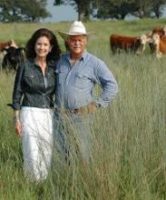This October we are featuring Mr. James K. Rooter Brite, Jr. from Bowie, Texas. Rooter is a father, rancher, conservationist, and my friend. The Brite Ranch has been a member of the Texas and Southwestern Cattle Raisers Association (TSCRA) for Rooter’s entire life. He has been a director of the TSCRA since 1999, and has served on their Agriculture and Research and Natural Resources and Environmental committees since 1994. He has served as a director of the Upper-Elm Red Soil and Water Conservation District since 1979. He has served on the Association of Texas Soil and Water Conservation Districts board and on the Texas State Soil and Water Conservation Board. He represents the National Association of Conservation Districts on the National Grazing Lands Conservation Initiative steering committee. Additionally, he serves on the National Cattlemen’s Beef Association, Natural Resource and Environment Committee.
 How did you get your start in ranching? I am a third
How did you get your start in ranching? I am a third
generation on this ranch. I was born and raised on the ranch where my grandfather J.A. Brite purchased in 1929. I took over my dad’s cow herd in the mid-1960s and purchased the ranch from dad in 1974, when I began full-time management of the ranch with my wife, Lynda, and eventually my son, J.K.
How important is agriculture to your family? Agriculture is about one third of my income. You have to look at the cumulative value of everything you do on the land. Management decisions you make now will make a difference 30 years from now. It all adds up, whichever direction you go. At an early age I learned the cause and effect of different land management practices. These first-hand lessons I learned from the land stimulated my desire to learn more and be diversified in my management. I apply land management practices that are practical, using common sense. I don’t do things because they are what somebody else thinks might be good. I do things because they work on this land, and that’s what makes the difference.
What makes ranching in West Texas so unique? The only constant is inconsistency with the weather and markets.
Do you feel like there is enough emphasis on agriculture in K-12 education? There needs to be a much greater attention on ag, but it must be taught by qualified and experienced teachers.
Who did you learn the most from along the way? By college age, I was intrigued by the land so I enrolled in Texas Christian University’s two-year Ranch Management program. TCU Professor Chip Merrill inspired me to try new things and not be afraid to try something different. I approached the resource management of the ranch using a short-term reactionary response to changing forage, production, and anticipated market condition. My long-term management is of a continuing upward trend in success of native forage. I feel like we can utilize our current management methods and maintain, or in areas of need, improve the productivity of this ranch in an economically and environmentally sustainable manner.